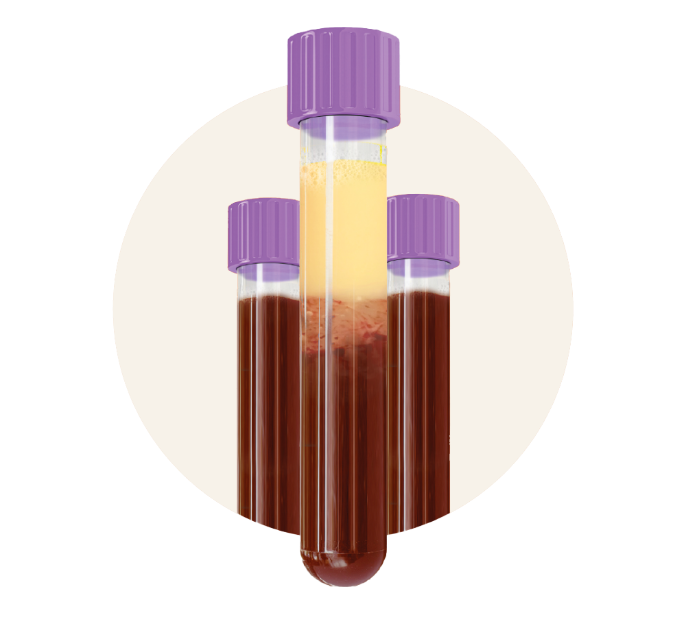What is FCS
Understanding Familial Chylomicronemia Syndrome (FCS)
Familial Chylomicronemia Syndrome (FCS) is a very rare genetic disorder characterized by extremely high fat levels in the blood.1
How does FCS affect the body?2
Normal Fat Transport: Our blood normally transports fats from food to various parts of the body. Certain fats, known as triglycerides, are bound to transport molecules called chylomicrons. Certain enzymesEnzymes accelerate the conversion of specific substances (substrates) into other products break down triglycerides and chylomicrons to metabolize these fats for use in the body.
In FCS: These enzymes do not function properly in FCS, leading to a massive build-up of triglycerides (hypertriglyceridemia) and chylomicrons in the blood (chylomicronemia).1
The main enzyme affected is LPL (lipoprotein lipase), however other enzymes may also be involved:1,3,4
ApoC2
Apolipoprotein C2
(2-5%)
ApoA5
Apolipoprotein A5
(2-5%)
LMF1
Lipase maturation factor 1
(1-2%)
GPIHBP1
Glycosylphosphatidylinositol-anchored HDL-binding protein 1
(5-10%)
Discover the story of Krish, a 31-year-old patient living with familial chylomicronemia syndrome (FCS). Learn about her life from diagnosis at just a few weeks old to managing her condition. Due to the lack of a lipase enzyme, she cannot digest fat and must limit her daily fat intake to 10 grams. If she exceeds this amount, she suffers from severe abdominal pain or pancreatitis.
Experience the story of Krish, a patient with FCS. Learn about Krish’s early experiences with dietary restrictions and the feelings of exclusion she faced during her childhood. See the crucial role her mother played in providing unwavering support throughout her journey. Understand how Krish adjusted her lifestyle, including her work hours and social activities, to improve her health.
Did you know?
Since FCS is genetic, it can be inherited from one generation to the next.
Important: FCS is not caused by a particular lifestyle or dietary habits, but by genetic defects (mutations).
Symptoms

A key sign of FCS is blood that appears “milky” when drawn, due to the high content of chylomicrons and triglycerides. After the so-called fridge test the blood in the test tube shows typical layers.3
Typical symptoms include: Frequent abdominal and back pain as well as vomiting or diarrhea.3,5

Complication of FCS
High triglyceride levels can lead to inflammation of the pancreas (pancreatitis). The risk increases with rising triglyceride levels. Due to the severely high triglyceride levels, FCS patients have a very high risk of developing pancreatitis.3,5,6
Did you know?
FCS is an inherited disease, which means it is passed down through families. It requires lifelong treatment.
Since FCS is very rare and the symptoms are often non-specific, the diagnostic evaluation should be performed by a physician who has experience with FCS or similar disorders.
Finding More Information
For further information about the disease and to find specialists in your area, you can visit Orphanet.
Find your expert at OrphanetComprehensive Management of FCS
Due to the wide range of symptoms and impact of FCS, comprehensive clinical management and holistic support for each patient is required.
Lowering Blood Lipids
In general, blood lipids must be lowered through various measures. The cornerstone of this is a diet low in fat and calories.
Role of a Dietician
A dietician can help adjust the patient’s nutrition and provide ongoing support to maintain an appropriate diet.
Dietary control
<10–15% daily caloric intake from fat or 15–20 g of fat per day5,7,8,9
Limited carbohydrates and simple sugars7,9
Avoid drugs known to increase TG levels such as such as thiazides, beta blockers, and exogenous estrogen5,7
Avoid alcohol5,7,9
Treatment
In addition to dietary measures, various drug treatments can be considered. Ask your doctor for more information.
Services
Since FCS is an inherited disease, it requires lifelong management. This is not always easy and can may impact quality of life. Especially the nutrition is often a challenge. Here you find valuable information on FCS and nutrition as well as delicious recipes tailored for patients with FCS.
You can find these downloadable materials on FCS: Services

References
- Gaudet D, et al. Targeting APOC3 in the familial chylomicronemia syndrome. N Engl J Med. 2014 Dec 4;371(23):2200-6. doi: 10.1056/NEJMoa1400284. PMID: 25470695.
- Bashir, B. et al. Severe Hypertriglyceridaemia and Chylomicronaemia Syndrome—Causes, Clinical Presentation, and Therapeutic Options. Metabolites 2023, 13, 621
- Moulin P, et al. Identification and diagnosis of patients with familial chylomicronaemia syndrome (FCS): Expert panel recommendations and proposal of an ”FCS score”. Atherosclerosis. 2018;275:265-72
- Hegele et al. Rare dyslipidaemias, from phenotype to genotype to management: a European Atherosclerosis Society task force consensus statement Lancet Diabetes Endocrinol 2020; 8: 50–67
- Davidson M, et al. The burden of familial chylomicronemia syndrome: Results from the global IN-FOCUS study. J Clin Lipidol 2018;12(4):898–907.
- Valdivielso P, Ramírez-Bueno A, Ewald N. Current knowledge of hypertriglyceridemic pancreatitis. Eur J Intern Med. 2014 Oct;25(8):689-94.
- Williams L, et al. Familial chylomicronemia syndrome: Bringing to life dietary recommendations throughout the life span. J Clin Lipidol. 2018; 12:908–19.
- Burnett JR, Hooper AJ, Hegele RA. Familial Lipoprotein Lipase Deficiency. 1999 Oct 12 [Updated 2017 Jun 22]. In: Adam MP, Mirzaa GM, Pagon RA, et al., editors. GeneReviews® [Internet]. Seattle (WA): University of Washington, Seattle; 1993-2023. Available from: https://www.ncbi.nlm.nih.gov/books/NBK1308/.
- Alexander L, et al. Familial chylomicronaemia Syndrome (FCS): Medical Nutrition Therapy for Patients and Providers. Presented at NLA Scientific Sessions; Philadelphia,PA; 17–20 May, 2017.
Pancreatitis – what is it?
Acute pancreatitis is a sudden inflammation of the pancreas. The primary symptom is severe, sudden pain in the upper abdomen. Other symptoms may include nausea and vomiting.
Hypertriglyceridemia - signs & symptoms
Severely high triglyceride levels are associated with a broad spectrum of non-specific symptoms. If you experience any of these symptoms, it is important to get your triglyceride levels tested.
Causes of high triglyceride levels
High triglyceride levels, also known as hypertriglyceridemia, indicate a disorder of fat metabolism. This can have multiple causes…
